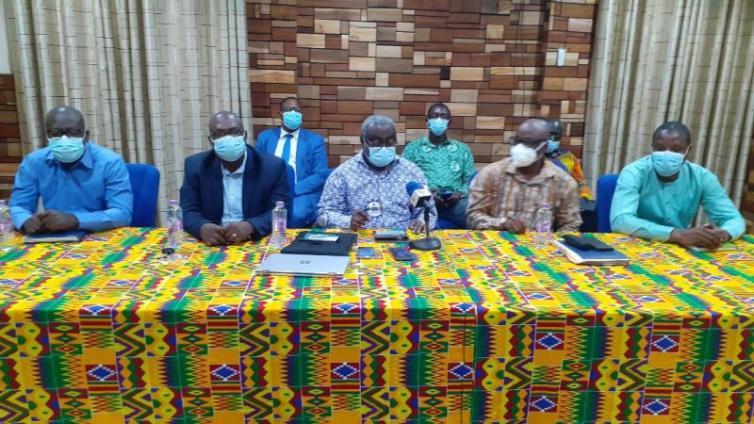The Teachers and Educational Workers Union (TEWU) has given a two-week ultimatum to the government to address concerns relating to the Union's condition of service to aid teaching and learning in the Public Universities.
The Union is calling on the government to respond promptly to the concerns of TEWU in the Public Universities to avoid any further disruption of academic work on the campuses.
Mr. Mark Denkyira Korankye, the General Secretary of TEWU on Tuesday in a press briefing in Accra, expressed concerns about the way the Union has been neglected over their condition of service for over two years.
"Since January when we embarked on our industrial action, the National Labour Commission invited us and the other negotiating parties and charged us to go back and re-enter negotiations."
"However, on February 4, 2022, we re-entered negotiation on two major items, which are the non-basic allowance and the exposure to eminent hazard allowance", he said.
He said after going through series of meetings, the government team continued to maintain their stance of offering eight per cent on its non-basic allowance, which was earlier offered by the Chief of Staff in January, 2021, but the Union stated that the rate was not in sync with the tenet of negotiation.
On the advice of the Minister for Employment and Labour Relations, he said, a Technical Committee was set up to look at various options and make recommendations to the Minister on the way forward on the issue.
The General Secretary said the Committee completed the assignment and recommended between 10 to 15 per cent increment on the Union's non-basic allowance but government's delay in implementing the recommendations is causing more harm than good to its members.
"Despite our resolve to pursue constructive engagement with all stakeholders in addressing our concerns, the posture of feet dragging by government agencies, tend to point to the obvious consequence of labour unrest," he said.
He said the Union had on several occasions objected to the situation where stakeholders always think the issues of the non-teaching staff were secondary when there were discussions on policies, conditions of service and other interventions at the educational sector.
The impression, he stated was created as though only the teacher group was critical in ensuring conducive teaching and learning environment.
Latest Stories
-
2024 WAFCON: Ghana drawn against defending champions South Africa in Group C
21 mins -
Photos from DW-JoyNews street debate on ‘galamsey’
1 hour -
Mimmy Yeboah: Blending heritage with global sophistication, confidence redefined through couture
1 hour -
Akufo-Addo commissions 97-km Tema-Mpakadan railway line
2 hours -
Majority requests recall of Parliament
2 hours -
Kanzlsperger and Professor Quartey support WAFA with medical Donation
2 hours -
Gideon Boako donates 10 industrial sewing machines to Yamfo Technical Institute
2 hours -
‘Golden Boy’ Abdul Karim Razak honored at WAFU-B general assembly
3 hours -
Buipewura Jinapor secures Vice Presidential position in National House of Chiefs with record votes
3 hours -
2024 election: I want results to come out like ‘milk and honey’ – Toobu
3 hours -
Ghana’s Henry Bukari hands over chairmanship of ECOWAS Brown Card Council of Bureaux
3 hours -
Residents of Dome-Kwabenya on edge ahead of December elections
3 hours -
Moffy drops new single ‘Wo’, blending culture and modernity
4 hours -
Don’t bring soldiers to polling stations – Martin Kpebu
4 hours -
Ogyeahohuo Yaw Gyebi II retained as President of National House of Chiefs
4 hours

